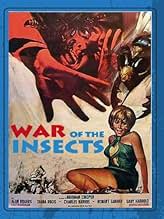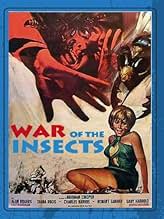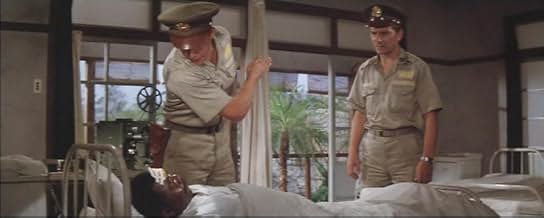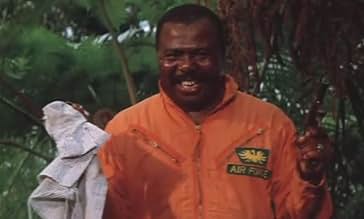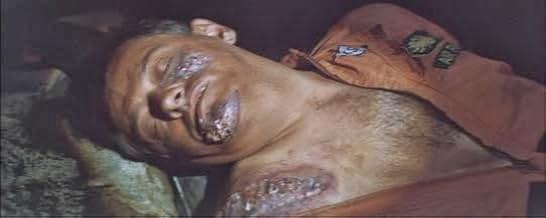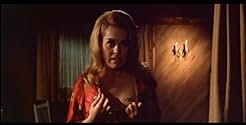IMDb-BEWERTUNG
4,7/10
803
IHRE BEWERTUNG
Füge eine Handlung in deiner Sprache hinzuAll the insects on Earth become wild and attack humans, causing Armageddon.All the insects on Earth become wild and attack humans, causing Armageddon.All the insects on Earth become wild and attack humans, causing Armageddon.
- Regie
- Drehbuch
- Hauptbesetzung
Ralph Jesser
- Lieutenant Gordon
- (as Rolf Jesser)
Mike Danning
- Aircraft Captain
- (as Mike Daneen)
Empfohlene Bewertungen
All the insects on Earth become wild and attack humans, causing Armageddon.
The film's staff includes Shizuo Hirase as the cinematographer, who also worked on the Shochiku films "The X from Outer Space" and "Goke, Body Snatcher from Hell". Composer Shunsuke Kikuchi, who also worked on "Goke", does the music here; he may be best known today for "Female Convict Scorpion" or perhaps "Dragon Ball Z".
Because this was the last horror film Shochiku would produce, it is suitably ambitious and apocalyptic. This is dark, bleak, and edgy beyond what we typically see from horror of the era, especially in Japan. We (at least Americans) expect men in rubber suits to beat on each other, but this is a far worse menace!
The film's staff includes Shizuo Hirase as the cinematographer, who also worked on the Shochiku films "The X from Outer Space" and "Goke, Body Snatcher from Hell". Composer Shunsuke Kikuchi, who also worked on "Goke", does the music here; he may be best known today for "Female Convict Scorpion" or perhaps "Dragon Ball Z".
Because this was the last horror film Shochiku would produce, it is suitably ambitious and apocalyptic. This is dark, bleak, and edgy beyond what we typically see from horror of the era, especially in Japan. We (at least Americans) expect men in rubber suits to beat on each other, but this is a far worse menace!
GENOCIDE (1968) is a Japanese sci-fi movie with an apocalyptic theme and a mix of intriguing elements that culminate in a rather bleak denouement. I don't want to give away any of the twists, so suffice it to say that a series of separate experiments involving poisonous insects by a pair of disparate characters fuses with a plot about an American H-bomb that's been accidentally dropped—intact—on a remote Japanese island and is the subject of a frenetic search by American officers and shady local characters with ulterior motives of their own. What I found most significant about this film is the presence of so many non-Japanese characters, including an arrogant American Colonel (played by Ralph Jesser), a black American airman named Charly (Chico Roland), and Annabelle (Kathy Horan), a blonde from Eastern Europe with deep emotional scars from WWII. The majority of scenes feature interaction with non-Japanese characters and the tensions between the Japanese and the Americans are quite palpable, much more so than in most Japanese films I've seen set in the postwar era. In the Japanese-language/English-subtitled edition which I watched for this review (released by Criterion), all the characters speak Japanese to each other and all are post-dubbed by Japanese voice actors. Even inside the plane, the Americans speak only Japanese to each other. This is not always the case with Japanese movies featuring non-Japanese characters. For instance, I've seen Chico Roland in other movies, including Koreyoshi Kurahara's BLACK SUN (1964), and he speaks only English in that one. And in numerous kaiju (giant monster) movies, there are scenes with American crew members or scientists and they often speak English to each other (albeit sometimes dubbed by Japanese voice actors speaking heavily accented English).
The plot of GENOCIDE is rather complicated but is deftly told in a compact 84 minutes, with all the different tangents coming together for quite a suspenseful finale. The Americans are not only eager to find the missing H-bomb, but are also intent on finding out who—or what-- killed two of the American crew members. The local police on the island take custody of an insect collector named Joji (Yusuke Kawazu) who is in possession of a watch that belonged to one of the crewmen. Joji is married to a local girl, Yukari (Emi Shindo), but is having an affair with Annabelle. Joji's employer, a biologist named Dr. Nagumo (Keisuke Sonoi), comes to the island to try to aid Joji's efforts to prove his innocence and help with the case any way he can. He becomes the nominal hero of the piece. Annabelle experiments with insects and may have something to do with the strange, unpredictable behavior of insects in the area, including a cloud of them that enveloped the American bomber plane and brought it down. Things heat up with various characters in the course of the narrative and Charly, the black airman wounded in the crash of the plane carrying the bomb, becomes the cruelly-treated pawn of the various factions in conflict on the island. Eventually, we learn that the insects have an agenda of their own.
There are some special effects sequences, chiefly involving obvious miniatures representing the planes seen in the film and the insect "clouds" that attack them. There are some miniature sets of structures on the island, although most outdoors scenes were shot on location on an actual island, with indoor scenes done in studio sets. The insect action seems to be done mostly with live insects, which must have been quite a chore for the crew to handle, although the scenes are quite effective. One extremely harrowing sequence involves the young couple, Joji and Yukari, trapped in a hut under attack by the insects. There are frequent closeups of insects at work, including quite a few gruesome shots of insects biting flesh or leaving eggs inside the skin or organs of human victims. I don't know how much special effects work was involved in these shots, but they're all quite convincing. Viewers who get freaked out by these kinds of images should avoid this film.
There are distinct anti-nuclear and anti-war sentiments expressed throughout the film and a disgust with the way U.S.-Soviet confrontations impact negatively on everyone else. Memories of World War II are frequently invoked. Some of the characters seem to have been designed purely to voice certain sentiments heard in the film. The fast pace of the narrative keeps us from dwelling on that problem too much. The ending may not be a conclusive one, although I think that might have been the point. This isn't a fun film like something you'd see in the Godzilla and Gamera series of the time or, say, THE GREEN SLIME, which came out a month later and offers its own distinct pleasures, but it is compelling and much harder-edged than the average Japanese sci-fi film of the 1960s. Some may find it disturbing, but I'd definitely recommend it as a unique and unusual viewing experience for fans of Japanese genre films.
The plot of GENOCIDE is rather complicated but is deftly told in a compact 84 minutes, with all the different tangents coming together for quite a suspenseful finale. The Americans are not only eager to find the missing H-bomb, but are also intent on finding out who—or what-- killed two of the American crew members. The local police on the island take custody of an insect collector named Joji (Yusuke Kawazu) who is in possession of a watch that belonged to one of the crewmen. Joji is married to a local girl, Yukari (Emi Shindo), but is having an affair with Annabelle. Joji's employer, a biologist named Dr. Nagumo (Keisuke Sonoi), comes to the island to try to aid Joji's efforts to prove his innocence and help with the case any way he can. He becomes the nominal hero of the piece. Annabelle experiments with insects and may have something to do with the strange, unpredictable behavior of insects in the area, including a cloud of them that enveloped the American bomber plane and brought it down. Things heat up with various characters in the course of the narrative and Charly, the black airman wounded in the crash of the plane carrying the bomb, becomes the cruelly-treated pawn of the various factions in conflict on the island. Eventually, we learn that the insects have an agenda of their own.
There are some special effects sequences, chiefly involving obvious miniatures representing the planes seen in the film and the insect "clouds" that attack them. There are some miniature sets of structures on the island, although most outdoors scenes were shot on location on an actual island, with indoor scenes done in studio sets. The insect action seems to be done mostly with live insects, which must have been quite a chore for the crew to handle, although the scenes are quite effective. One extremely harrowing sequence involves the young couple, Joji and Yukari, trapped in a hut under attack by the insects. There are frequent closeups of insects at work, including quite a few gruesome shots of insects biting flesh or leaving eggs inside the skin or organs of human victims. I don't know how much special effects work was involved in these shots, but they're all quite convincing. Viewers who get freaked out by these kinds of images should avoid this film.
There are distinct anti-nuclear and anti-war sentiments expressed throughout the film and a disgust with the way U.S.-Soviet confrontations impact negatively on everyone else. Memories of World War II are frequently invoked. Some of the characters seem to have been designed purely to voice certain sentiments heard in the film. The fast pace of the narrative keeps us from dwelling on that problem too much. The ending may not be a conclusive one, although I think that might have been the point. This isn't a fun film like something you'd see in the Godzilla and Gamera series of the time or, say, THE GREEN SLIME, which came out a month later and offers its own distinct pleasures, but it is compelling and much harder-edged than the average Japanese sci-fi film of the 1960s. Some may find it disturbing, but I'd definitely recommend it as a unique and unusual viewing experience for fans of Japanese genre films.
I'm rating this movie higher than it probably deserves for a couple of reasons. Firs, one has to admire the audacious, lurching combination of genres and plot lines, hallucinatory in their variations. Secondly, the final two shots of this movie are stunning. I won't give them away, although I wish I could because they are just some of the coolest final images of any science fiction movie of that era, and make the entire movie worthwhile.
All of these impressions reflects some advice I would give if you choose to watch this movie. I don't think one ought to watch it literally, as a plot-driven film, because doing so could be frustrating given some of the illogic and seeming randomness of the events. Instead, I ultimately watched it for the imagery, the drunken, staggering wackiness of it all, and the utterly fascinating cultural aspects of the movie (for example, wow, do Americans not come off particularly well in this flick!).
I would also recommend Genocide for those who enjoy eco-horror or eco-scifi, such as Frogs, Phase IV, Bug (the Bradford Dillman flick), Food of the Gods, and even classic giant irradiated "bug" movies such as Them and Tarantula, which were among the first eco-scifi movies.
All of these impressions reflects some advice I would give if you choose to watch this movie. I don't think one ought to watch it literally, as a plot-driven film, because doing so could be frustrating given some of the illogic and seeming randomness of the events. Instead, I ultimately watched it for the imagery, the drunken, staggering wackiness of it all, and the utterly fascinating cultural aspects of the movie (for example, wow, do Americans not come off particularly well in this flick!).
I would also recommend Genocide for those who enjoy eco-horror or eco-scifi, such as Frogs, Phase IV, Bug (the Bradford Dillman flick), Food of the Gods, and even classic giant irradiated "bug" movies such as Them and Tarantula, which were among the first eco-scifi movies.
In GENOCIDE (aka: WAR OF THE INSECTS), a new insect species is discovered on an island. Disturbingly, the venom of these tiny creatures causes insanity in anyone bitten by them.
Meanwhile, a B-52 Bomber, complete with its full nuclear arsenal, crashes nearby, after being swarmed by the killer bugs. Carnage ensues, as nefarious men attempt to procure the bombs, and the insects begin destroying humanity.
The most interesting aspect of this movie is its diverse, unusual cast of characters. There are actual, flawed people inhabiting the island, some of whom are very damaged. Some are downright reprehensible! Especially, the wicked Annabelle (Cathy Horan), a concentration camp survivor who takes on the very characteristics of the Nazis from her tortured past. Her plot for global annihilation is the black center of the movie.
This is an ambitious project that suffers from its miniscule budget, as well as the merciless march of time. Released in the 1960's, it's certainly a movie of its period. Still, it's worth seeing at least once...
Meanwhile, a B-52 Bomber, complete with its full nuclear arsenal, crashes nearby, after being swarmed by the killer bugs. Carnage ensues, as nefarious men attempt to procure the bombs, and the insects begin destroying humanity.
The most interesting aspect of this movie is its diverse, unusual cast of characters. There are actual, flawed people inhabiting the island, some of whom are very damaged. Some are downright reprehensible! Especially, the wicked Annabelle (Cathy Horan), a concentration camp survivor who takes on the very characteristics of the Nazis from her tortured past. Her plot for global annihilation is the black center of the movie.
This is an ambitious project that suffers from its miniscule budget, as well as the merciless march of time. Released in the 1960's, it's certainly a movie of its period. Still, it's worth seeing at least once...
This time, the insects trying to destroy humanity aren't giant ones. It's all of them, though, which is worse.
Like most well-made science fiction movies, this has a strong symbolic component, rendering it a fable or parable. Here, the thought is that mankind is being destroyed by its inability to communicate and thus cooperate. American soldiers are looking for "Eastern bloc" spies, and try to find a lost H-bomb without anyone finding out; the blonde lady who's using the insects hates people; a girl thinks of having an abortion, because she doesn't know that her lover wants it.
Some characters can't be found, some won't talk, resulting in a solution being impossible to arrive at. Normally I would call this idiot plotting, a problem that wouldn't be a problem if people talked. Here, that's the point of this movie: problems are caused by people not talking.
Like most well-made science fiction movies, this has a strong symbolic component, rendering it a fable or parable. Here, the thought is that mankind is being destroyed by its inability to communicate and thus cooperate. American soldiers are looking for "Eastern bloc" spies, and try to find a lost H-bomb without anyone finding out; the blonde lady who's using the insects hates people; a girl thinks of having an abortion, because she doesn't know that her lover wants it.
Some characters can't be found, some won't talk, resulting in a solution being impossible to arrive at. Normally I would call this idiot plotting, a problem that wouldn't be a problem if people talked. Here, that's the point of this movie: problems are caused by people not talking.
Wusstest du schon
- WissenswertesThe film received the comedic riff treatment by the Mystery Science Theater 3000 (1988) crew in "Cinematic Titanic" under its original U.S. title "War of the Insects".
- VerbindungenFeatured in Cinematic Titanic: War of the Insects (2011)
Top-Auswahl
Melde dich zum Bewerten an und greife auf die Watchlist für personalisierte Empfehlungen zu.
- How long is Genocide?Powered by Alexa
Details
- Erscheinungsdatum
- Herkunftsland
- Sprache
- Auch bekannt als
- War of the Insects
- Produktionsfirma
- Weitere beteiligte Unternehmen bei IMDbPro anzeigen
- Laufzeit
- 1 Std. 24 Min.(84 min)
- Sound-Mix
- Seitenverhältnis
- 2.45 : 1
Zu dieser Seite beitragen
Bearbeitung vorschlagen oder fehlenden Inhalt hinzufügen

